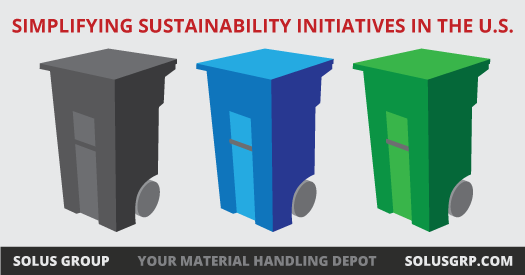We use cookies to make your experience better. To comply with the new e-Privacy directive, we need to ask for your consent to set the cookies. Learn more.
Simplifying Sustainability Initiatives in the U.S.
In 2012, 80 percent of the largest cities in the United States listed sustainability as one of their top five priorities. Cities across the nation are improving their efforts at environmental protection, and a key focus of these initiatives is, and has to be, household waste.
Waste disposal experts divide solid municipal garbage into three categories: solid waste destined for the landfill, recyclables set for reuse, and compost material that can contribute to civic composting projects. A major goal of contemporary sustainability plans is to minimize the first of these three categories by shifting waste into one of the latter two.
Experts recommend a few best practices for waste diversion plans at the municipal level (note that these are also great for companies, universities, and other institutions devoted to sustainability):
-
Mandate the use of separate containers for trash, recycling, and compost.
Whether you're the mayor of a town or the CEO of a small company, it's up to leadership to get the sustainability ball rolling. Encouragement is often not enough; when separating trash is a rule, people find it easier to comply.
-
Provide free bins for recycling and composting, plus a smaller bin for trash.

Bins themselves can help create the right psychology. Provide residents with separate containers for each type of waste, and slim down the size of the trash can to encourage the use of all three.
-
Cut costs at waste disposal/recycling sites with ergonomic equipment that improves productivity.
Sustainability initiatives are tough enough to pass without injured workers and slow processes adding to costs. Provide staff at municipal compost sites and recycling centers with Bin Dumpers from Solus Group. These heavy-duty material handling devices lift and empty bins of all sizes, saving staff from serious ergonomic hazards.
-
For municipalities, consider passing statutes incentivizing the diversion of "trash" to either recycling or composting programs.
Sometimes, encouraging people to participate in waste diversion takes a little extra push. The city council of Seattle recently passed an ordinance imposing fees for residents who discard compostable food scraps in regular trash cans. If you're having a hard time with compliance, rules like this can help.
Cities are increasingly concerned with sustainability, and they're responding with strong sustainability programs. Americans composted 1.84 million tons of food scraps in 2013. By the following year, that figure was up to 1.94 million tons.
The 89 million tons of solid waste that was recycled in 2014 saved 181 million metric tons of carbon dioxide and other greenhouse emissions. That's certainly a step in the right direction.
The leaner and safer cities can make their recycling and composting programs, the more taxpayers will support them. While granular decisions about equipment seem like unimportant details, they might make the difference between improving sustainability and backsliding into our single-trash-can past.
References:
"10 Sustainability and Earth Day Facts." ICMA. International City/County Management Association, 22 Apr. 2014. Web. 27 June 2017.
"Advancing Sustainable Materials Management: 2014 Fact Sheet." EPA. United States Environmental Protection Agency, Nov. 2016. PDF. 27 June 2017.
Housley, Alan. "Measuring and Improving Waste Diversion is Key to Sustainability Initiatives." Loadman. Creative Microsystems, Inc., Oct. 2014. PDF. 27 June 2017.
"Local Sustainability 2012: Taking Stock and Moving Forward Global Review." ICLEI. Local Governments for Sustainability, 2012. PDF. 27 June 2017.
